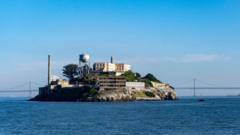Former President Donald Trump has announced a bold and controversial initiative to reopen Alcatraz prison, the legendary facility nestled in the waters near San Francisco's Golden Gate Bridge, which was closed in 1963. In a post on his Truth Social platform, Trump described the move as a response to what he perceives as escalating crime, proposing that the newly refurbished prison would serve as a "symbol of law, order, and justice."
The notorious facility, once home to notorious criminals like Al Capone and George "Machine Gun" Kelly, has become a successful tourist destination since its closure. Yet, Trump insists that it should be repurposed to accommodate "America's most ruthless and violent offenders," directing the Bureau of Prisons alongside several federal agencies to devise plans for a substantial expansion and reconstruction of the site.
Responses to Trump's proposal have been swift and critical. Leading Democrats, including former House Speaker Nancy Pelosi, have labeled the suggestion as unrealistic, with California state senator Scott Wiener branding it "deeply unhinged" and a challenge to legal standards. Experts like Professor Gabriel Jack Chin from the University of California have pointed out the impracticalities of reopening such an expensive facility, noting that the existing federal prison system is currently under capacity, showcasing a 25% decrease in inmate numbers from historical peaks.
While Trump's announcement aims to communicate a tough stance on crime, critics argue that the re-opening of Alcatraz would not be a feasible solution. The infrastructure required to revitalize this once-closed facility would demand significant financial investment, raising questions about the efficacy and necessity of such a venture in light of available resources within the current prison system.





















